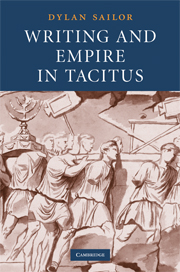Book contents
- Frontmatter
- Contents
- Acknowledgments
- List of abbreviations and editions used
- Introduction: a life, in fragments
- Chapter 1 Autonomy, authority, and representing the past under the Principate
- Chapter 2 Agricola and the crisis of representation
- Chapter 3 The burdens of Histories
- Chapter 4 “Elsewhere than Rome”
- Chapter 5 Tacitus and Cremutius
- Conclusion: on knowing Tacitus
- Works cited
- Index of passages discussed
- General index
Chapter 1 - Autonomy, authority, and representing the past under the Principate
Published online by Cambridge University Press: 22 September 2009
- Frontmatter
- Contents
- Acknowledgments
- List of abbreviations and editions used
- Introduction: a life, in fragments
- Chapter 1 Autonomy, authority, and representing the past under the Principate
- Chapter 2 Agricola and the crisis of representation
- Chapter 3 The burdens of Histories
- Chapter 4 “Elsewhere than Rome”
- Chapter 5 Tacitus and Cremutius
- Conclusion: on knowing Tacitus
- Works cited
- Index of passages discussed
- General index
Summary
THE HISTORIAN'S VOICE
ἐπιεικῶς γὰρ ἅπαντες νομίζουσιν εἰκόνας εἶναι τῆς ἑκάστου ψυχῆς τοὺς λόγους.
It is a universal and correct opinion that a man's words are the images of his very soul.
(Dionysius of Halicarnassus 1.1.3)The writer and the man are not always the same person.
(Sir Ronald Syme [1970: 10])I start with a paradox. That funerary inscription with which we began advertises Tacitus' political distinctions. To judge by what he wrote, however, it might seem shocking that he had a political career at all. He acknowledges that facet of his life in prominent places, and we would know less about him if he did not (Hist. 1.1.3, Ann. 11.11.1). Yet his works dwell on the corrupting and contaminating effects of the Principate on Roman society and often seem to suggest that political life under the Principate is only an empty, poisonous charade. How, you want to ask, could that same historian who saw with such clarity, and condemned with such trenchancy, the hypocrisy and vanity of the Principate also want to take part in it? In other words, should he not rather have shaken the dust from his feet and gone into retirement, done anything rather than live the deplorable lie?
Our concern here is of course naive, in that it confuses the “Tacitus” narrating these works with the historical person P. Cornelius Tacitus.
- Type
- Chapter
- Information
- Writing and Empire in Tacitus , pp. 6 - 50Publisher: Cambridge University PressPrint publication year: 2008



